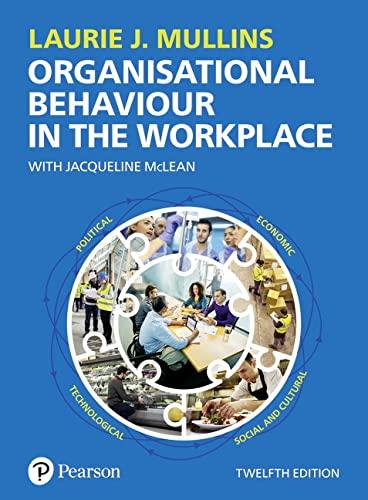In this zone, we critically examine the concept of performance management and evaluate whether it still has
Question:
In this zone, we critically examine the concept of performance management and evaluate whether it still has a role in the changing twenty-first century workplace.
For over three decades, researchers and practitioners have focused on engendering a greater understanding of, and facilitating an influence on, the development and improvement of performance management systems in organisations.37 A proliferation of research in the past few years has sought to challenge existing thinking and determine whether managing performance in an individual context still has a role in the changing twentyfirst century workplace.38 The findings of such researches have been rather startling.
Even though tools, methods, processes and systems have been developed to aid the execution of performance management, overall operational implementation has been disappointing.37 The CIPD38 report that traditional performance management practices, specifically performance appraisal, are outdated and do not work. They advise that more and more employers have begun to question the actual relevance and value of traditional performance management systems and processes. They add, ‘if employers were once enamoured with performance appraisals, they clearly aren’t now’ So, why, arguably, do employers appear to have fallen out of love with performance management?
Before attempting to answer this question, it is necessary to define the concept (in the absence of a definitive definition) and identify its key activities and objectives.
According to Aguinis39 (p. 2), performance management is defined as ‘a continuous process of identifying, measuring and developing the performance of individuals and teams and aligning performance with the strategic goals of the organisation.’ This differs from performance appraisal, which Aguinis describes as the ‘depiction of the strengths and weaknesses of employees in a noncontinuous manner, typically just once a year’ The CIPD define it as an activity that encompasses three key activities. First, it establishes objectives, through which individuals and teams identify their role in achieving the organisation’s mission and strategy. Second, it improves the performance of individuals, teams and the organisation. Third, it holds individuals to account for their own performance and how it relates to other aspects of the peopleorganisation relationship, including reward and career progression.
Both definitions emphasise the strategic nature of the process and alignment with what the organisation ultimately wants to achieve. Importantly, The CIPD advocates that it should not just focus on performance outcomes but also on the development of individual knowledge, skills and behaviour. Such development needs to be continuous and forwardthinking, rather than a perfunctory, ad hoc, transactional exercise that only focuses on an individual’s strengths and weaknesses.39, 40 According to Cappelli and Tavis,40 many organisations are rethinking performance management reviews/
appraisals because it no longer fits with their business needs. It has been described as a ‘last century practice’ that generates large amounts of paperwork, restricts collaboration and innovation and does not serve a real purpose. In addition, the authors assert that some organisations are acknowledging the loathing that managers and their direct reports have for the performance review/appraisal process. Rather than being an opportunity for individuals to discuss their past and future performance and likely learning and development needs, Jones41 laments that performance management is, instead, often manifested as a dreaded and resented paperbased, annual exercise that is relegated to the desk drawer or filing cabinet, only to be resurrected and revisited twelve months later. She caveats that the review process is, for many organisations, painfully ineffective, inconsistent and all too often unrelated to business objectives, strategies and outcomes. In this respect, it does little to contribute to building a strong peopleorganisation relationship and, one could argue, a positive relational psychological contract. In a rather damning indictment of performance management, Culbert42 contends that the review is a ‘broken system’ that is ‘fatally flawed.’ Commenting in the Wall Street Journal, Culbert43 proffered that it has a negative impact on corporate performance, is obstructive to ‘straighttalk relationships’ and a major cause of low morale in the workplace. He notes ‘even the mere knowledge that such an event will take place damages daily communication and teamwork.’
To conclude, one could argue that the negative viewpoints of performance management presented here make a compelling case for it to be supplanted with a system that will engender more engagement from, and commitment to, the process by all parties concerned in the peopleemployment relationship.
Cappelli and Tavis concur and report that some organisations have replaced annual performance reviews with feedback and coaching, particularly after the completion of key projects or milestones have been achieved. Removing the emphasis from performance to the identification of strengths and goals means that individuals and their organisations can be more strategic, collaborative, holistic rather than fragmented and focus on skill development for the future. Performance management still has a role in the changing twentyfirst century workplace – but not in its traditional form. As we have seen, it will need to metamorphose into a process that is welcomed, not dreaded, futureoriented rather than retrospective and concentrates on developing knowledge and creativity that serves a real purpose. As Jones41 concludes ‘performance management is not dead, but the old way of doing it certainly is.’
1.Pulakos and O’Leary and Cappelli and Tavis report that many organisations have begun to think differently about performance management and how it is used. With reference to theory and practice, discuss the reasons why this is the case.
2.What strategies can organisations adopt to engender a greater level of engagement with, and commitment to, reviewing individual performance?
3.Evaluate the benefits and drawbacks of adopting feedback and coaching as alternative tools to review/monitor performance.
Step by Step Answer:

Organisational Behaviour In The Workplace
ISBN: 9781292245485
12th Edition
Authors: Jacqueline Mclean, Laurie Mullins





